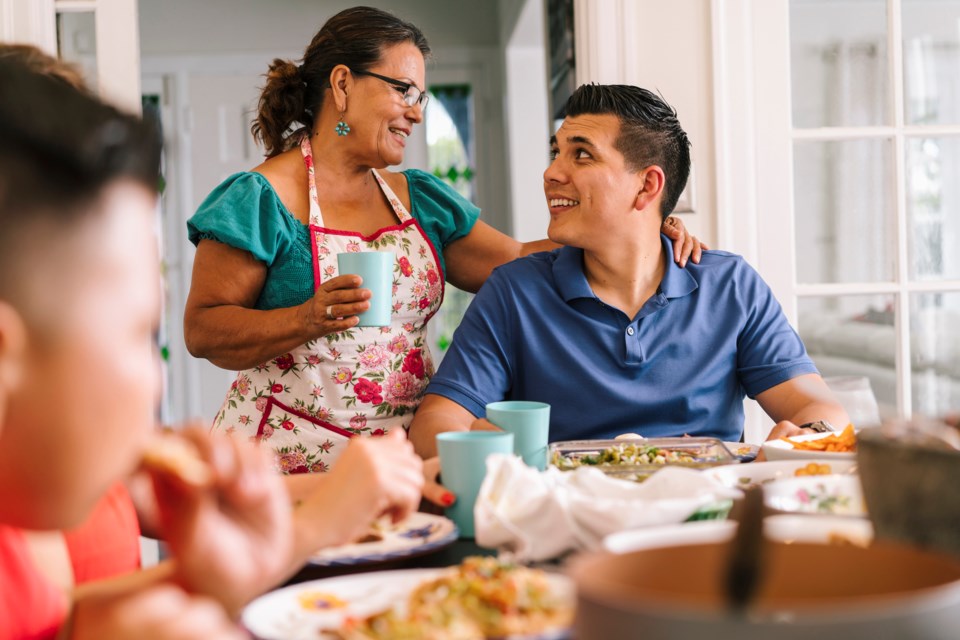Dear Ellie: My mother lives alone in the same house and same city where I grew up. I’m married, with two children in middle-school, and we live across the country from their grandmother.
For all the years we’ve been here, she regularly calls, emails, and insists on having FaceTime and Zoom conversations whenever she requests, which is often.
I do understand her wanting to see the kids more often than our once-a-year visit, but the awkward reality is that she’s openly and mostly wanting to see me.
My wife finds it almost “creepy” that my mother, though polite to her daughter-in-law, and chatty with the children, will always first insist on speaking to me.
She wants to know everything about me — what I’m eating, if I’m exercising, have I seen a doctor (she frequently raises a health problem that I haven’t had since I was a teenager), asks why I didn’t get a raise, what I’m going to do about it, etc.
She then challenges much of what I’ve told her in response.
How do I distance myself from her intrusive phone calls and questions?
Clinging Mother
Your mother sees you as her main object of worry and needing her advice. Also, her own life may be very lonely.
Perhaps your teenage health issue was serious enough to frighten her into helicopter-Mom mode. But that was long ago and her current behaviour is now pushing you away.
Reverse the dialogue. Ask about her day/friends/activities. She may be asking so much about you because she has little happening for herself.
Set gentle boundaries. Tell her that you love her and want to be in touch but that your work and family life are at very busy stages.
Offer a specific time slot for catching up, e.g., a specific hour on a weekend day, after regular kids’ and family activities so you can talk about them, and switch the focus away from being only on you.
It may take time and patience to adjust her habit of intrusively frequent contact.
Meanwhile, there are years ahead when your mother may truly need more involvement from you regarding her own life. And she’s likely very aware of that. Ask her important questions about her health.
Reader’s Commentary regarding the son whose father is suffering a “terrible grief” (Jan. 26):
“When I was 27, I met the love of my life. I felt like my heart would jump out of my chest.
“Fifteen months later, he was diagnosed with Ewing’s Sarcoma (a type of bone cancer). He’d been frequently complaining of shoulder pain and finally made a doctor’s appointment. He was diagnosed the day after his 27th birthday.
“He gave me the option to back out of our relationship but I stood by him throughout. We got married between his chemo treatments and lived the best life we could.
“I felt guilty about not finding it earlier.
“Grievance counselling does help you see that this wasn’t something you could prevent or predict. You have to journey through it.
“The letter-writer’s father has to forgive himself, and know it wasn’t his fault.
“I was sent immediately into grievance counselling by my counsellor from caregivers’ sessions. It was the best thing for me.
“I didn’t have the long years this gentleman had with his wife, but I do know “survivor’s guilt” very well.”
Dear Ellie: I’m a man, mid-40s, married 10 years, father of a two-year-old.
I’ve always struggled to refrain from “checking out” attractive women. I also struggle against sending out a “vibe” when working closely with an attractive woman.
I’ve never been accused of doing anything inappropriate. Yet it’s something I consider as a weakness.
As a father, I’m even more aware of wanting to set a healthy example.
How can I build healthy mental frameworks and exchange bad habits for good habits?
Seeking Personal Improvements
Awareness of uncomfortable reactions is a positive step. Concerns about what you see as a weakness will help you recognize your own “triggers.”
Having your own child to raise/protect with your wife is a major motivation to “build healthy mental frameworks.”
Meet online with a counsellor who hears and responds to the questions, doubts and concerns you’ve had. It’s crucial to your dealing directly with this ongoing sense of weakness.
Ellie’s tip of the day
A parent obsessing about a healthy, happy adult son, is likely lonely, and seeking/needing attention to her own health and well-being.
Send relationship questions to [email protected].




